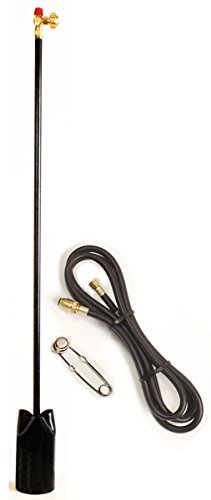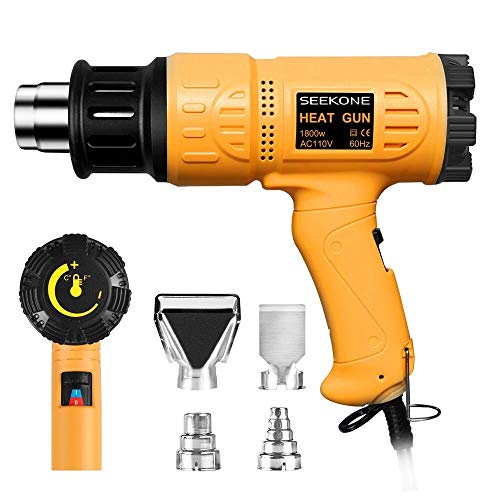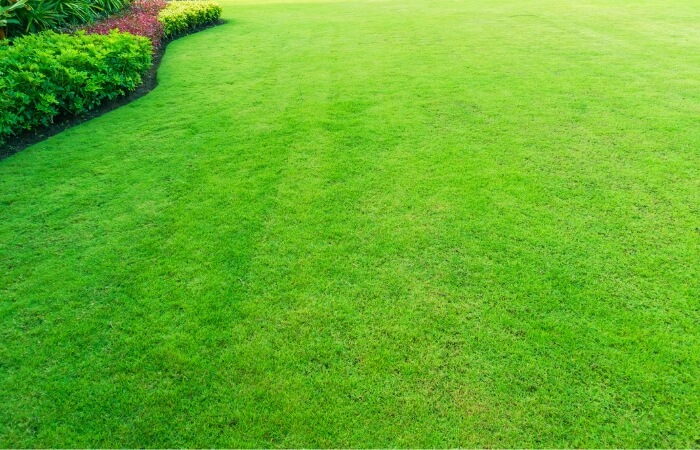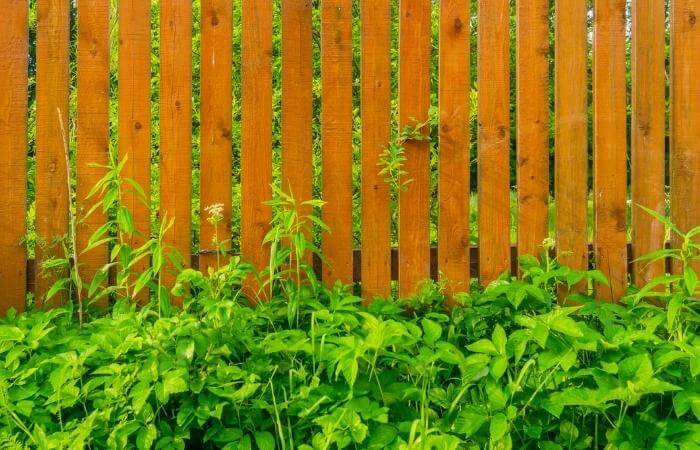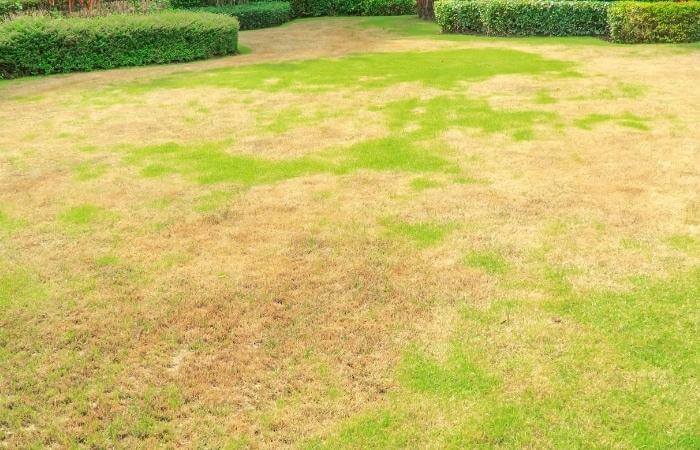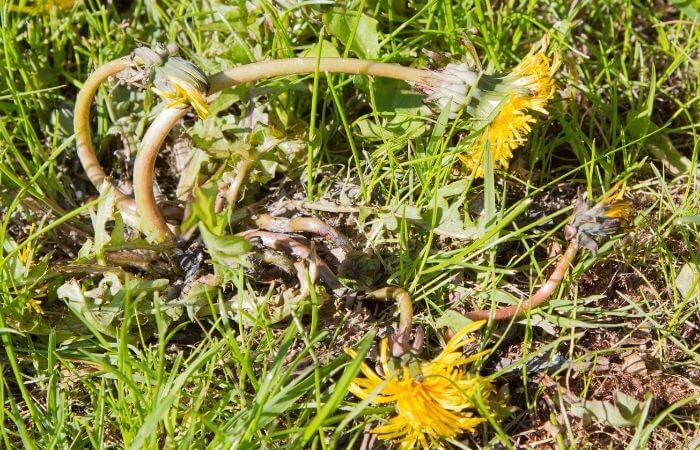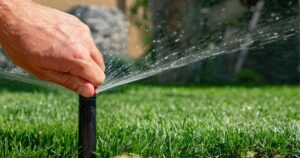Do you wish you could take a flame-thrower to annoying lawn and garden weeds?
Well, you can, as there are residential weed burners to do just that. But, you may wonder how well they work and if they are safe.
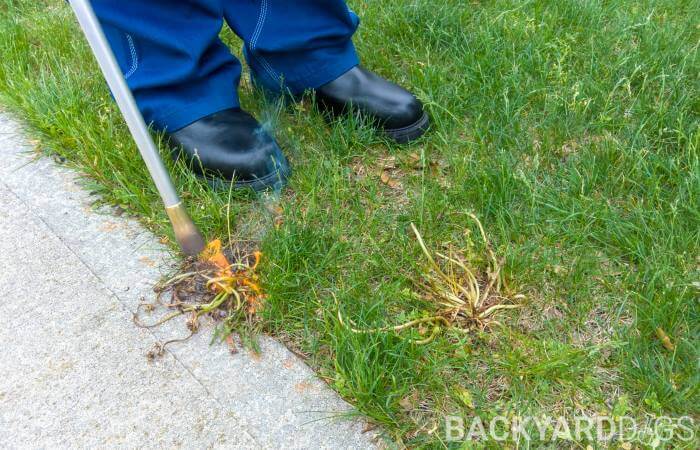
To get the important answers to these questions, read this quick guide to garden and lawn weed burners. By the end, you’ll have the information you need to make a smart decision about whether burning away troublesome weeds will work for you!
Can You Burn Weeds To Get Rid Of Them?
Yes, you can get rid of weeds by burning them to destroy plant tissue. You don’t have to burn the weed foliage to a crisp. Any intense heat to the leaves will destroy the internal cells, which will then die off.
For home landscaping needs, most people opt for a lightweight weed burning tool that you carry around targeting weeds.
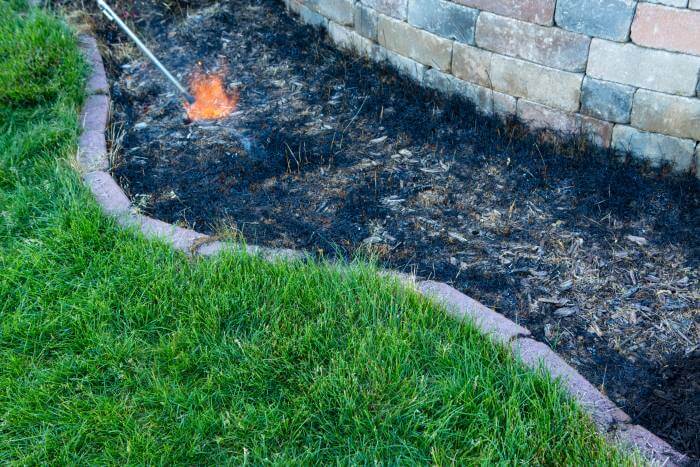
Next are the pros and cons of burning weeds.
Pros:
- Doesn’t damage soil structure which can cause erosion
- No harmful chemicals that can run-off into waterways or harm people or pets
- Straightforward to use
- Destroys seeds so they can’t germinate
- Fairly inexpensive to purchase and operate
Cons:
- Must strictly follow safety precautions to avoid fires
- An invisible flame is easy to accidentally touch
- Smoke or vapor from burning poison ivy or oak can lead to respiratory issues
- Must only burn weeds, and not your lawn or ornamental plantings
- May leave unsightly char marks patio blocks or wood landscaping timbers
For a dense proliferation of weeds over a large piece of undeveloped land, an open burn is typical. This type of weed burning needs fire-breaks and vigilant observation to keep it from getting out of control.
Many municipalities forbid open burns for fear of forest fires.
Related | Composting Weeds and Can Compost Catch Fire?
Ways To Burn Weeds

There are two safer ways to burn common weeds from your garden or lawn and one other method that works but can be highly dangerous.
Related | Weed Removal Tools That Don’t Require A Flame
Let’s look at three fiery methods, along with safety tips and risks to watch out for.
Propane Torch Or Weed Burning Wand
Most home-improvement stores sell propane weed burners that consist of a long wand that attaches to a small propane tank and disperses the flame from the tip.
This type of weed burner keeps the heat the flame several feet from the body, which is safer than a handheld propane torch commonly in use for soldering.
Handheld propane torch attachments are standard, but the design entails crouching down to reach weeds, whereas a weed burner with a long wand avoids this problem.
You can reuse propane weed burners by swapping out the propane cylinder when it’s empty, which is cost-effective. The flame at the tip is also smaller, which helps you focus on only the weed.
The risk with a propane torch is the open flame, which can spread to dry yard debris and into an uncontrollable fire quickly, especially on windy days.
Heat Gun
My personal favorite for burning weeds is using a heat gun, such as those in use for stripping paint.
The heat will burn the plant’s cells and kill off the foliage, but no open flame helps to stop accidental fires from starting, although still possible.
A nozzle on the gun can help pinpoint only the weed, preventing other plants from damage. Without a nozzle, the heat is more widespread and can harm other plants.
For a plug-in model, you’ll need an extension cord long enough to reach your property, which can be a deterrent. There are cordless heat gun models, but they are much more expensive than plug-in versions.
Heat guns are better for crisping up the foliage but not for burning it away, which a propane weed burner can do quickly.
The risk of using a heat gun is that with no flame to warn you away from the hot tip visually, it’s easier to burn the skin accidentally.
Flammable Liquid And A Match
As satisfying as it is to douse a weed in lighter fluid or gasoline and set it afire with a match, this method is fraught with dangers.
First, you need to add a flammable liquid to a spray bottle so you can spritz the weed’s foliage.
Nearly every time you spray, you can get the flammable liquid on nearby plants, as well as the possibility of getting it on your clothing. Lighting the fluid can then lead to a quick-spreading flame that can:
- Runoff through your property, burning up dried grass and leaves in its path
- Catch clothing on fire
- Burn curious pets or children who sneak up to see what you’re doing
I recommend you avoid open burning, no matter how big or small, as it involves too many risks.
Does Burning Weeds Kill The Roots?
When you burn weeds, you only destroy the foliage and not the roots.
Perennial weeds like dandelions have a deep and robust root system that can quickly bounce back from damage to the foliage, popping up new shoots in a matter of days. If you burn off new growth immediately, after several sessions, you may find the weed gives up the fight.
Unfortunately, often this “win” is temporary, with bits of stubborn root regenerating by the next growing season.
The most success comes from using this weed removal technique on annual weeds, where burning the foliage can cause enough stress to the root system that the plant cannot regrow.
On a positive note, using a weed burner will destroy seeds, which is helpful to keep them from spreading across your yard. As most seeds pop out near the top of the weed, you can destroy them while staying clear of grass.
Burning Weeds vs Roundup
Is Roundup more effective in controlling weeds than burning them? The answer isn’t quite as simple as you think.
Roundup is a broad-spectrum herbicide, which will target weeds and kill them down to the root, which a weed burner cannot do.
The issue with Roundup is that the glyphosate in the formula will also kill grasses, trees, plants, and bushes, as well as expose people, pets, and the environment to harmful chemicals.
Trying to accurately spray Roundup on only the offending weed can be just as challenging as burning one in an expanse of grass.
The benefit of weed burning over Roundup is that it offers a short-term solution without adding detrimental chemicals to your property.
For example, you can quickly and completely burn off weeds growing in the cracks of your patio or driveway before a party or family gathering and use a broom or leaf blower to clear away the debris.
Spraying Roundup entails having to wait for the chemicals to reach the roots to kill off weeds, which can take several days to a week.
In Summary
Weed burners can have a place in your landscape maintenance plan when you understand how to use them and what type of weeds they are most effective for.
I hope this guide clarifies the answer to the question, “Do weed burners work for your garden and lawn?” and you have all the information you need to decide if this weed-removal method will work for you.
Combining all the tools available to achieve a weed-free lawn and garden can add up to a stunning landscape that upgrades your home’s curb appeal!
